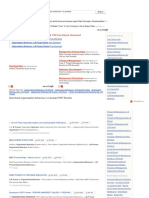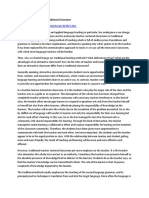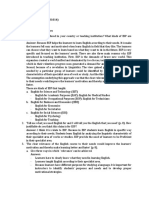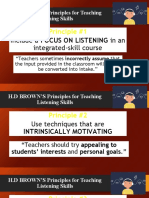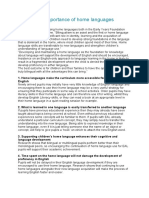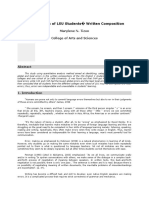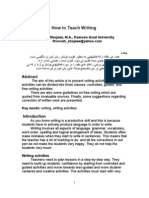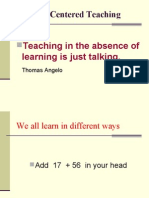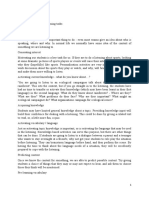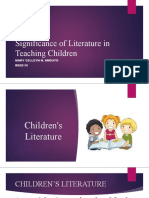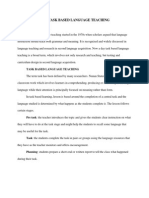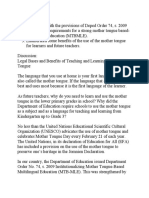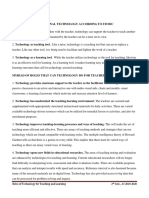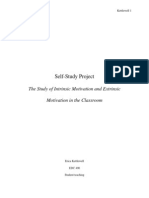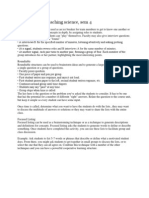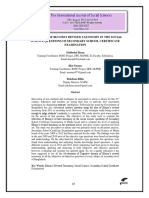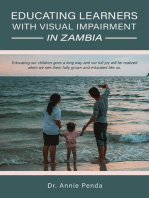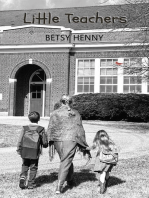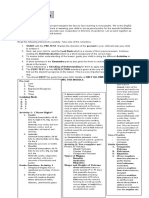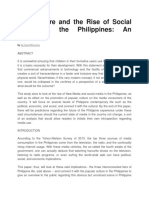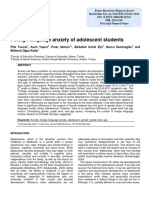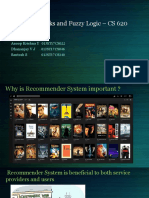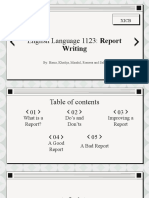Professional Documents
Culture Documents
The Importance of Teaching Literature
The Importance of Teaching Literature
Uploaded by
Joselle ReyesOriginal Description:
Original Title
Copyright
Available Formats
Share this document
Did you find this document useful?
Is this content inappropriate?
Report this DocumentCopyright:
Available Formats
The Importance of Teaching Literature
The Importance of Teaching Literature
Uploaded by
Joselle ReyesCopyright:
Available Formats
THE IMPORTANCE OF TEACHING LITERATURE disadvantage.
The same goes for Shakespeare’s dramas,
and for the novels of early American writers. Current
written by: Haley Drucker • edited by: Laurie books and movies, among other works, often reference
Patsalides • updated: 7/30/2015 older texts. Without a working knowledge of those
older texts, you can’t understand the new ones as fully
Most people assume literature is an important part of
as possible.
education. But not everyone really thinks about why
that is. The importance of literature on teaching lies in Expanding Horizons
its ability to foster critical reading, build valuable skills,
and expand students' worldviews. Everyone has a tendency to get so caught up in their
own lives that they forget what’s going on in the world
Literature in the Classroom around them. And children and teens are particularly
prone to this. It’s a goal of education to expose them to
In today’s fact-obsessed culture, the importance of
ideas from other cultures, to teach them about the
literature on teaching and the classroom is sometimes
histories and peoples of other times and places.
questioned. Why bother Teaching Literature
Literature is an ideal way to do this. Huckleberry Finn,
having kids read stories, spend their time with books for example, puts students into the mind of a boy living
about things and events that aren’t even real? Why not in the south in the 1800s, letting them experience his
just teach them what they need to know and send them life firsthand. Through this experience they learn what it
on their way? was like to live in that time period, how the people
talked and thought and acted.
Of course, to most educators these questions seem
ludicrous. Of course literature is important—why would The same goes for books about other countries, which
it have such a central place in the curriculum if it teach students what life is like in other parts of the
wasn’t? But you may not realize in just how many ways world. It’s more engaging to read a novel about another
literature really does contribute to a child’s education. time or place than to learn about it in a lecture or from
Because education is and should be about more than a textbook. The Diary of Ann Frank is a great example of
passing on dry information; it’s also about fostering this effect, since it exposes students American students
critical thinking skills and an understanding of the world to both a country and time period not their own (and
around us. most likely a nationality and religion as well).
Cultural Value Building Vocabulary
Stories have been of central importance to the human Having a large and wide-ranging vocabulary is essential
race ever since it began, as far as we can tell. Cultures for a number of reasons. It helps with both writing and
are built on stories—histories, myths and legends, reading abilities, of course, but it also allows for more
fables, religions, and so on. If students are to complex discourse. The larger your vocabulary is, the
understand and participate in the culture to which they more in depth and thoughtful discussions you can have
belong, they must first learn about the stories that on important topics and issues, both in and outside of
culture has been built around. And while books aren’t the classroom. When people speak they tend to use a
the only kinds of stories out there, they are one of the fairly limited vocabulary, so the best way to become
most important. exposed to new words is to read.
Take the Bible, for instance. Despite concerns about
religion in schools, it is commonly taught in some form
or another because it has so heavily influenced our And reading literature is a great way to build and
enhance vocabulary. Due to the descriptive nature of a
culture. References and allusions to biblical stories are
all around us, so not knowing those stories puts you at a story, any novel will include plenty of words students
have likely never seen or heard before. They’ll see those
words in context, learning their meanings passively in a novel, the themes it presents, the author’s purpose
rather than having to drill. And because they’re reading in writing it, and the ways it fits into a certain time
a story and not drilling, they probably won’t even period. You can also analyze its impact on society and
realize they are building their vocabulary (hence they the ways it compares and contrasts with other texts.
won’t be able to complain about it). Few activities give students’ critical abilities such a
workout as the close reading of a work of literature.
Improving Writing Skills
And Many More…
Writing skills can be taught, to some extent. But the
number one way to become a better writer is to read This is hardly an exhaustive list, of course. But these are
often. When you read you are being immersed in some of the most essential reasons why literature is so
language, in the way it sounds and feels when put important to education and why it should remain at the
together in the right ways. Students who are heart of the curriculum. Literature takes students out of
encouraged to read have a more intimate knowledge of their own lives and lets them experience things that are
the ways in which language works, and so have an new and challenging, and encourages them to imagine
advantage when it comes time for them to write. This possibilities and to think about ways the world could be
effect can even be made transparent by encouraging different. Few textbooks could be said to do the same
students to try writing in a particular book or author's thing.
style.
Many older works of literature are still taught primarily
because of their authors’ way with language. Novels
such as The Great Gatsby, The Scarlet Letter, and The
Catcher in the Rye are noted for their unique style and
creativity with language. And there are plenty of more
recent novels that are just as well written. Literature
serves as a valuable teacher and an example to students
who are first learning to use written language to
communicate with the world.
Teaching Critical Thinking
Education is supposed to give students the tools they
need to become a valuable part of society, and one such
tool is the ability to think critically. We want them to
not just passively consume whatever is around them,
but to analyze and criticize it as well. Literature serves
this goal in a couple of ways. Many novels encourage
critical thinking on their own, due to the issues and
themes they explore. The kind of novel usually taught in
the classroom is selected for its depth and for the way it
transcends the obvious and the cliché.
And educators often use literature to promote this kind
of thought actively, by teaching students how to
analyze what they read, understand others’ opinions
about the text, and formulate their own views. You can
learn to think critically about the events and characters
You might also like
- RIASSUNTO Harmer Fifth EditionDocument156 pagesRIASSUNTO Harmer Fifth EditionpersefonekoretarotNo ratings yet
- Iep RedactedDocument11 pagesIep Redactedapi-503401778No ratings yet
- Matching Type and Supply ItemDocument13 pagesMatching Type and Supply ItemDimasuhid Jacq-Lyn A.100% (1)
- Search PDF Books Com Ion Behaviour L M Prasad PDFDocument3 pagesSearch PDF Books Com Ion Behaviour L M Prasad PDFAarti GuptaNo ratings yet
- Strategies Listening and Reading ComprehDocument34 pagesStrategies Listening and Reading ComprehliuviaNo ratings yet
- Arts and Creativity Literacy: Reporter: Diasanta, John Mark T. & Jagonoy, JoanDocument14 pagesArts and Creativity Literacy: Reporter: Diasanta, John Mark T. & Jagonoy, JoanJaira Marie Escorpizo0% (1)
- What Is Pre ReadingDocument4 pagesWhat Is Pre ReadingMuhammad Furqan YarNo ratings yet
- Learning Styles and TeachingDocument11 pagesLearning Styles and TeachingJava JavakNo ratings yet
- Global CitizenshipDocument5 pagesGlobal CitizenshipBianca VacunawaNo ratings yet
- Language Policy Bernard SpolskyDocument14 pagesLanguage Policy Bernard SpolskyMarília Malaquias50% (4)
- Think Pair Share SquareDocument1 pageThink Pair Share SquareCatherine OdiamarNo ratings yet
- Interactive Classroom vs. Traditional ClassroomDocument4 pagesInteractive Classroom vs. Traditional ClassroomPulkit VasudhaNo ratings yet
- Teaching of English Language Through Group Work in Large ClassesDocument85 pagesTeaching of English Language Through Group Work in Large ClassesMohammad RafiuddinNo ratings yet
- Challeges Facing EFL Teachers in Mixed Ability ClassesDocument13 pagesChalleges Facing EFL Teachers in Mixed Ability ClassesAnonymous rWJCoarANo ratings yet
- Mother TongueDocument10 pagesMother TongueAinah LaoNo ratings yet
- Developing Cultural Awareness in Foreign Language Teaching PDFDocument5 pagesDeveloping Cultural Awareness in Foreign Language Teaching PDFDulce Itzel VelazquezNo ratings yet
- MulticulturalDocument3 pagesMulticulturalPrincess Priah FerrerNo ratings yet
- Formalistic Approach To CriticismDocument19 pagesFormalistic Approach To CriticismEmmanuel ApuliNo ratings yet
- Performance Task RubricsDocument5 pagesPerformance Task RubricsCarina Margallo CelajeNo ratings yet
- Safika Safri (1940601014) - Local B (2019) - ESP - Task 1Document2 pagesSafika Safri (1940601014) - Local B (2019) - ESP - Task 1Safika SafriNo ratings yet
- Read Aloud Lesson PlanDocument6 pagesRead Aloud Lesson Planapi-384648038No ratings yet
- Stages in A Listening LessonDocument36 pagesStages in A Listening LessonArly MicayabasNo ratings yet
- 3.1. Pedagogical Theories Supporting The Use of ICT PDFDocument21 pages3.1. Pedagogical Theories Supporting The Use of ICT PDFRobert Johnson33% (3)
- Adverbs of Manner: I.E Francisco José de Caldas Teacher: Diana Paola Salazar SuarezDocument20 pagesAdverbs of Manner: I.E Francisco José de Caldas Teacher: Diana Paola Salazar SuarezYenny Yurley Jaimes BoadaNo ratings yet
- Essential Skills For Reading ComprehensionDocument13 pagesEssential Skills For Reading ComprehensionHaw Haw Thet Paing100% (1)
- Function of Culture: Assignment OnDocument4 pagesFunction of Culture: Assignment OnArifNo ratings yet
- Importance of Home LanguageDocument2 pagesImportance of Home LanguageElmehdi MayouNo ratings yet
- Role of Society in Education DevelopmentDocument6 pagesRole of Society in Education DevelopmentAngelineNo ratings yet
- Types of AssessmentDocument7 pagesTypes of AssessmentVui Na100% (1)
- Error Analysis of LSU StudentsDocument21 pagesError Analysis of LSU StudentsMuhammad Arfan0% (1)
- Computer Mediated Communication AnalysisDocument20 pagesComputer Mediated Communication Analysisi_khandelwal100% (1)
- Teacher Education For Mother Tongue - Based Education ProgramsDocument15 pagesTeacher Education For Mother Tongue - Based Education ProgramsLuke SueNo ratings yet
- Assessing Listening in The Language Classroom PDFDocument8 pagesAssessing Listening in The Language Classroom PDFNicolas OjedaNo ratings yet
- Module - 5 SOCIAL STUDIESDocument14 pagesModule - 5 SOCIAL STUDIESGervin CapablancaNo ratings yet
- Teaching WritingDocument12 pagesTeaching WritingAmir AzizNo ratings yet
- Elt Module 2 Unit 5 W4Document3 pagesElt Module 2 Unit 5 W4LineClar RealNo ratings yet
- Learner Centered Teaching: Teaching in The Absence of Learning Is Just TalkingDocument27 pagesLearner Centered Teaching: Teaching in The Absence of Learning Is Just TalkingTerry Doyle100% (3)
- Pre Listening ActivitiesDocument5 pagesPre Listening ActivitiesCarmen VinterNo ratings yet
- Language AcquisitionDocument2 pagesLanguage AcquisitionMandy ChengNo ratings yet
- Significance of Literature in Teaching ChildrenDocument11 pagesSignificance of Literature in Teaching ChildrenJhoanna Marie Diaz0% (1)
- Classroom Management Plan Ed PlanningDocument11 pagesClassroom Management Plan Ed Planningapi-253536172No ratings yet
- Eng 10 Teaching of Listening and ReadingDocument2 pagesEng 10 Teaching of Listening and ReadingRamil GofredoNo ratings yet
- Task Based Language Teaching .Document3 pagesTask Based Language Teaching .Jyothi ThomasNo ratings yet
- Recording and TranscribingDocument6 pagesRecording and TranscribingEdward ErnestNo ratings yet
- Thee Little Pigs Essay 2016Document5 pagesThee Little Pigs Essay 2016Tom GatsbyNo ratings yet
- ED MTB Module 1Document8 pagesED MTB Module 1Mabel De Lara-MacapagalNo ratings yet
- Roles of Technology For Teaching and LearningDocument5 pagesRoles of Technology For Teaching and LearningNaprel TalagtagNo ratings yet
- Self-Study Project Intrinsic and Extrinsic MotivationDocument7 pagesSelf-Study Project Intrinsic and Extrinsic Motivationapi-247222888No ratings yet
- Approaches and MethodsDocument25 pagesApproaches and MethodsOmar Khalid ShohagNo ratings yet
- 20 Methods in Teaching ScienceDocument8 pages20 Methods in Teaching ScienceHamidah JamaludinNo ratings yet
- InsetDocument77 pagesInsetclytielejarde100% (1)
- Barriers To Educating The Deaf in KenyaDocument9 pagesBarriers To Educating The Deaf in KenyaJack OwitiNo ratings yet
- Facilitating Learner-Centered Teaching 04 Individual DifferencesDocument27 pagesFacilitating Learner-Centered Teaching 04 Individual DifferencesJonathan AysonNo ratings yet
- Reflection of Bloom's Revised Taxonomy in The Social PDFDocument10 pagesReflection of Bloom's Revised Taxonomy in The Social PDFAngelou BagsikNo ratings yet
- The Role of The English TeacherDocument7 pagesThe Role of The English TeacherVidya PatilNo ratings yet
- Issues of Inclusive Education Some Aspects To Be ConsideredDocument24 pagesIssues of Inclusive Education Some Aspects To Be Consideredapi-308992256No ratings yet
- Prelim - Developmental Reading 1Document19 pagesPrelim - Developmental Reading 1Aiza C. Abungan-Galzote100% (1)
- Authentic and Traditional AssessmentsDocument5 pagesAuthentic and Traditional Assessmentsapi-299665237No ratings yet
- Maam Maghannoy Teaching in Elementary GradesDocument12 pagesMaam Maghannoy Teaching in Elementary GradesGeraldine DensingNo ratings yet
- Educating Learners With Visual Impairment In ZambiaFrom EverandEducating Learners With Visual Impairment In ZambiaRating: 5 out of 5 stars5/5 (1)
- The Importance of Developing Reading for Improved Writing Skills in the Literature on Adult Student's LearningFrom EverandThe Importance of Developing Reading for Improved Writing Skills in the Literature on Adult Student's LearningNo ratings yet
- Teaching: Literature Should Be Made An Essential Part ofDocument3 pagesTeaching: Literature Should Be Made An Essential Part ofHimangshu SarmahNo ratings yet
- Parent's Guide: Answer KeyDocument2 pagesParent's Guide: Answer KeyJoselle ReyesNo ratings yet
- Science 9 Q3 Week 3 1Document11 pagesScience 9 Q3 Week 3 1Joselle Reyes0% (1)
- Science 9 Q3 Week 2Document8 pagesScience 9 Q3 Week 2Joselle ReyesNo ratings yet
- Science 9: Third QuarterDocument13 pagesScience 9: Third QuarterJoselle ReyesNo ratings yet
- Pop Culture and The Rise of Social MediaDocument9 pagesPop Culture and The Rise of Social MediaJoselle ReyesNo ratings yet
- Ijamr201002 Social Media PDFDocument4 pagesIjamr201002 Social Media PDFJoselle ReyesNo ratings yet
- Kaam Ka ChizDocument4 pagesKaam Ka Chizpapunjay kumarNo ratings yet
- B. Read The Poem "You Are A Teacher" Then Answer The Following QuestionsDocument2 pagesB. Read The Poem "You Are A Teacher" Then Answer The Following QuestionsIvan CasTilloNo ratings yet
- Iready ScoresDocument2 pagesIready Scoresapi-377600775No ratings yet
- APILADO - Self-Rate Philosophy of EducationDocument5 pagesAPILADO - Self-Rate Philosophy of Educationjemar apiladoNo ratings yet
- English First Fce From 2015 Writing Part 1Document7 pagesEnglish First Fce From 2015 Writing Part 1María Gabriela FonsecaNo ratings yet
- Ej 1274624Document6 pagesEj 1274624lu piNo ratings yet
- HUMSS - MCT12-Ia-b-3 HUMSS - MCT12-Ia-b-4 HUMSS - MCT12-Ia-b-5 HUMSS - MCT12-Ia-b-6 HUMSS - MCT12-Ia-b-7Document5 pagesHUMSS - MCT12-Ia-b-3 HUMSS - MCT12-Ia-b-4 HUMSS - MCT12-Ia-b-5 HUMSS - MCT12-Ia-b-6 HUMSS - MCT12-Ia-b-7Fonzy Rone100% (1)
- 2014 Aip Accomplishment ReportDocument2 pages2014 Aip Accomplishment ReportLeodigaria Reyno100% (3)
- Winton Wood Superintendent Evaluation 15-16Document14 pagesWinton Wood Superintendent Evaluation 15-16WCPO 9 News100% (1)
- 12 Maja Nenadovic Using Debate Method in The ClassroomDocument8 pages12 Maja Nenadovic Using Debate Method in The ClassroomIoana PescaruNo ratings yet
- E.Rodriguez Jr. High School: Mayon Avenue, Brgy. NS Amoranto, Quezon City AY: 2019-2020Document7 pagesE.Rodriguez Jr. High School: Mayon Avenue, Brgy. NS Amoranto, Quezon City AY: 2019-2020joanne carlosNo ratings yet
- Format Internship I YearDocument7 pagesFormat Internship I YearTanishq RathoreNo ratings yet
- M.Ed. CBCS 2022 FinalDocument28 pagesM.Ed. CBCS 2022 FinalAnshumanNo ratings yet
- Contoh Rancangan Pengajaran Harian Bahasa Inggeris Tahun 1 2016Document27 pagesContoh Rancangan Pengajaran Harian Bahasa Inggeris Tahun 1 2016cocorunner100% (1)
- Magsaysay Ave. Karangalan Village, Manggahan Pasig CityDocument3 pagesMagsaysay Ave. Karangalan Village, Manggahan Pasig CityJamieRostataFernandezNo ratings yet
- Principle and Methods of Teaching AccountingDocument3 pagesPrinciple and Methods of Teaching AccountingRAIN ALCANTARA ABUGANNo ratings yet
- TPR Lesson in Template NewDocument7 pagesTPR Lesson in Template Newapi-285718865No ratings yet
- What Are The Major Changes About How PMI Views Project Management?Document10 pagesWhat Are The Major Changes About How PMI Views Project Management?Ameni HaguiNo ratings yet
- Media and Information Literacy Quarter 1 - Module 1: The Influence of Media and Information To CommunicationDocument23 pagesMedia and Information Literacy Quarter 1 - Module 1: The Influence of Media and Information To CommunicationFerlie Meh Riola100% (2)
- Movi3 Recommender SystemDocument15 pagesMovi3 Recommender SystemDhananjay JahagirdarNo ratings yet
- MALL (Mobile Assisted Language Learning) - A Paradise For English Language LearnersDocument9 pagesMALL (Mobile Assisted Language Learning) - A Paradise For English Language LearnersIJ-ELTSNo ratings yet
- Exam Pattern BrochureDocument3 pagesExam Pattern BrochureHariom KumarNo ratings yet
- English Language - Report WritingDocument20 pagesEnglish Language - Report WritinghaiqaNo ratings yet
- FS2 Le5 Johnlloyd DelarosaDocument5 pagesFS2 Le5 Johnlloyd Delarosajohnlloyd delarosaNo ratings yet
- Sped Teacher IPCRFDocument8 pagesSped Teacher IPCRFprincess delin pasuquin100% (2)
- MTB - Mle Q1 W3Document7 pagesMTB - Mle Q1 W3Yunilyn GallardoNo ratings yet
- Lesson 10 Curriculum DocumentDocument3 pagesLesson 10 Curriculum Documentapi-583063116No ratings yet



